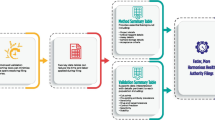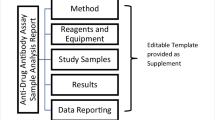Abstract
Purpose
Biological drugs in circulation can interfere with anti-drug antibody (ADA) assays and cause false ADA negatives. We surveyed the applications of biological products approved by FDA during 2005–2011 for prevalence of drug interferences and proposed approaches to address this issue scientifically.
Methods
The immunogenicity assay drug tolerance, steady-state drug concentrations, and immunogenicity rates were reviewed for 26 BLA/NDA and 2 sBLA.
Results
Many FDA approved biologics had higher steady-state drug concentrations than the drug tolerance of ADA assays, by 1.2- to 800-fold. Reported immunogenicity rates may be negatively impacted. Some sponsors triaged immunogenicity samples according to the drug tolerance, leaving some samples un-assayed or reporting them as inconclusive ADA; but these samples were interpreted as ADA− for calculating immunogenicity rates.
Conclusions
Implementation of ADA assays that can tolerate therapeutic drug concentrations is imperative. Given drug interferences, we propose in this paper the following practices: (i) to measure drug concentrations in ADA samples, (ii) to explicitly list all ADA status, including inconclusive ADA and un-assayed samples, (iii) to calculate population immunogenicity rates based on only subjects with confirmed ADA+ and ADA−, and (iv) to make available ADA assay specifics relevant to the use of ADA data in disease management.



Similar content being viewed by others
Abbreviations
- ADA:
-
anti-drug antibody
- BLA:
-
Biologics License Application
- EMA:
-
European Medicine Agency
- FDA:
-
Food and Drug Administration
- NDA:
-
New Drug Application
- TNFα:
-
tumor necrosis factor α
References
Mire-Sluis AR, Barrett YC, Devanarayan V, Koren E, Liu H, Maia M, et al. Recommendations for the design and optimization of immunoassays used in the detection of host antibodies against biotechnology products. J Immunol Methods. 2004;289(1–2):1–16.
Shankar G, Devanarayan V, Amaravadi L, Barrett YC, Bowsher R, Finco-Kent D, et al. Recommendations for the validation of immunoassays used for detection of host antibodies against biotechnology products. J Pharm Biomed Anal. 2008;48(5):1267–81.
Koren E, Smith HW, Shores E, Shankar G, Finco-Kent D, Rup B, et al. Recommendations on risk-based strategies for detection and characterization of antibodies against biotechnology products. J Immunol Methods. 2008;333(1–2):1–9.
FDA. Guidance for Industry—Assay Development for Immunogenicity Testing of Therapeutic Proteins (Draft) 2009: Available from: http://www.fda.gov/downloads/Drugs/GuidanceComplianceRegulatoryInformation/Guidances/UCM192750.pdf.
EMA(CHMP). Guideline on Immunogenicity Assessment of Biotechnology-derived Therapeutic Proteins2008: Available from: http://www.tga.gov.au/pdf/euguide/bmwp1432706en.pdf.
De Groot AS, Scott DW. Immunogenicity of protein therapeutics. Trends Immunol. 2007;28(11):482–90.
Aggarwal S. What's fueling the biotech engine-2010 to 2011. Nat Biotechnol. 2011;29(12):1083–9.
Miele E, Markowitz JE, Mamula P, Baldassano RN. Human antichimeric antibody in children and young adults with inflammatory bowel disease receiving infliximab. J Pediatr Gastroenterol Nutr. 2004;38(5):502–8.
Vultaggio A, Matucci A, Nencini F, Pratesi S, Parronchi P, Rossi O, et al. Anti-infliximab IgE and non-IgE antibodies and induction of infusion-related severe anaphylactic reactions. Allergy. 2010;65(5):657–61.
Emi Aikawa N, de Carvalho JF, Artur Almeida Silva C, Bonfa E. Immunogenicity of anti-TNF-alpha agents in autoimmune diseases. Clin Rev Allergy Immunol. 2010;38(2–3):82–9.
Bartelds GM, Krieckaert CL, Nurmohamed MT, van Schouwenburg PA, Lems WF, Twisk JW, et al. Development of antidrug antibodies against adalimumab and association with disease activity and treatment failure during long-term follow-up. JAMA. 2011;305(14):1460–8.
Yanai H, Hanauer SB. Assessing response and loss of response to biological therapies in IBD. Am J Gastroenterol. 2011;106(4):685–98.
Howman R, Kulkarni H. Antibody-mediated acquired pure red cell aplasia (PRCA) after treatment with darbepoetin. Nephrol Dial Transplant. 2007;22(5):1462–4.
Macdougall IC. Antibody-mediated pure red cell aplasia (PRCA): epidemiology, immunogenicity and risks. Nephrol Dial Transplant. 2005; (Suppl 4):iv9–15.
Casadevall N, Nataf J, Viron B, Kolta A, Kiladjian JJ, Martin-Dupont P, et al. Pure red-cell aplasia and antierythropoietin antibodies in patients treated with recombinant erythropoietin. N Engl J Med. 2002;346(7):469–75.
Mewar D, Wilson AG. Treatment of rheumatoid arthritis with tumour necrosis factor inhibitors. Br J Pharmacol. 2011;162(4):785–91.
Dougados M, Baeten D. Spondyloarthritis. Lancet. 2011;377(9783):2127–37.
Nielsen OH, Seidelin JB, Munck LK, Rogler G. Use of biological molecules in the treatment of inflammatory bowel disease. J Intern Med. 2011;270(1):15–28.
Karmiris K, Paintaud G, Noman M, Magdelaine-Beuzelin C, Ferrante M, Degenne D, et al. Influence of trough serum levels and immunogenicity on long-term outcome of adalimumab therapy in Crohn's disease. Gastroenterology. 2009;137(5):1628–40.
Radstake TR, Svenson M, Eijsbouts AM, van den Hoogen FH, Enevold C, van Riel PL, et al. Formation of antibodies against infliximab and adalimumab strongly correlates with functional drug levels and clinical responses in rheumatoid arthritis. Ann Rheum Dis. 2009;68(11):1739–45.
Pendley C, Shankar G. Bioanalytical interferences in immunoassays for antibody biotherapeutics. Bioanalysis. 2011;3(7):703–6.
Hart MH, de Vrieze H, Wouters D, Wolbink GJ, Killestein J, de Groot ER, et al. Differential effect of drug interference in immunogenicity assays. J Immunol Methods. 2011;372(1–2):196–203.
Postmarket Requirements and Commitments [database on the Internet]. Available from: http://www.accessdata.fda.gov/scripts/cder/pmc/index.cfm?StartRow=5&StepSize=1&Paging=Yes.
Pal S. FDA postmarketing surveillance. US Pharmacist. 2009;34(10):1.
FDA. Prescribing information for adalimumab (HumiraTM). 2011 (February 25): Available from: http://www.accessdata.fda.gov/drugsatfda_docs/label/2011/125057s0215lbl.pdf.
FDA. Prescribing information for ustekinumab (StelaraTM). 2010 (December 30): Available from: http://www.accessdata.fda.gov/drugsatfda_docs/label/2009/125261s001lbl.pdf.
FDA. Prescribing information for infliximab (RemicadeTM). 2011 (September 23): Available from: http://www.accessdata.fda.gov/drugsatfda_docs/label/2011/103772s5301lbl.pdf.
Bendtzen K, Ainsworth M, Steenholdt C, Thomsen OO, Brynskov J. Individual medicine in inflammatory bowel disease: monitoring bioavailability, pharmacokinetics and immunogenicity of anti-tumour necrosis factor-alpha antibodies. Scand J Gastroenterol. 2009;44(7):774–81.
Gonzaga JE, Ananthakrishnan AN, Issa M, Beaulieu DB, Skaros S, Zadvornova Y, et al. Durability of infliximab in Crohn's disease: a single-center experience. Inflamm Bowel Dis. 2009;15(12):1837–43.
Pascual-Salcedo D, Plasencia C, Ramiro S, Nuno L, Bonilla G, Nagore D, et al. Influence of immunogenicity on the efficacy of long-term treatment with infliximab in rheumatoid arthritis. Rheumatology. 2011;50(8):1445–52.
Perini P, Facchinetti A, Bulian P, Massaro AR, Pascalis DD, Bertolotto A, et al. Interferon-beta (INF-beta) antibodies in interferon-beta1a- and interferon-beta1b-treated multiple sclerosis patients. Prevalence, kinetics, cross-reactivity, and factors enhancing interferon-beta immunogenicity in vivo. Eur Cytokine Netw. 2001;12(1):56–61.
Miehsler W, Novacek G, Wenzl H, Vogelsang H, Knoflach P, Kaser A, et al. A decade of infliximab: The Austrian evidence based consensus on the safe use of infliximab in inflammatory bowel disease. J Crohns Colitis. 2010;4(3):221–56.
Connell W, Andrews JM, Brown S, Sparrow M. Practical guidelines for treating inflammatory bowel disease safely with anti-tumour necrosis factor therapy in Australia. Intern Med J. 2010;40(2):139–49.
Sun B, Bird A, Young SP, Kishnani PS, Chen YT, Koeberl DD. Enhanced response to enzyme replacement therapy in Pompe disease after the induction of immune tolerance. Am J Hum Genet. 2007;81(5):1042–9.
Dimichele D. The North American Immune Tolerance Registry: contributions to the thirty-year experience with immune tolerance therapy. Haemophilia. 2009;15(1):320–8.
Afif W, Loftus Jr EV, Faubion WA, Kane SV, Bruining DH, Hanson KA, et al. Clinical utility of measuring infliximab and human anti-chimeric antibody concentrations in patients with inflammatory bowel disease. Am J Gastroenterol. 2010;105(5):1133–9.
Patton A, Mullenix MC, Swanson SJ, Koren E. An acid dissociation bridging ELISA for detection of antibodies directed against therapeutic proteins in the presence of antigen. J Immunol Methods. 2005;304(1–2):189–95.
Smith HW, Butterfield A, Sun D. Detection of antibodies against therapeutic proteins in the presence of residual therapeutic protein using a solid-phase extraction with acid dissociation (SPEAD) sample treatment prior to ELISA. Regul Toxicol Pharmacol. 2007;49(3):230–7.
van Schouwenburg PA, Bartelds GM, Hart MH, Aarden L, Wolbink GJ, Wouters D. A novel method for the detection of antibodies to adalimumab in the presence of drug reveals "hidden" immunogenicity in rheumatoid arthritis patients. J Immunol Methods. 2010;362(1–2):82–8.
Mikulskis A, Yeung D, Subramanyam M, Amaravadi L. Solution ELISA as a platform of choice for development of robust, drug tolerant immunogenicity assays in support of drug development. J Immunol Methods. 2011;365(1–2):38–49.
Sickert D, Kroeger K, Zickler C, Chokote E, Winkler B, Grenet JM, et al. Improvement of drug tolerance in immunogenicity testing by acid treatment on Biacore. J Immunol Methods. 2008;334(1–2):29–36.
Chirmule N, Jawa V, Meibohm B. Immunogenicity to Therapeutic Proteins: impact on PK/PD and Efficacy. AAPS J. 2012;14(2):296–302.
Acknowledgments and Disclosures
The authors wish to thank Dr. E. Dennis Bashaw for the critical review of this manuscript and valuable comments.
The authors are employees of the FDA and did not receive external funding for this research project.
Author information
Authors and Affiliations
Corresponding author
Rights and permissions
About this article
Cite this article
Wang, YM.C., Fang, L., Zhou, L. et al. A Survey of Applications of Biological Products for Drug Interference of Immunogenicity Assays. Pharm Res 29, 3384–3392 (2012). https://doi.org/10.1007/s11095-012-0833-2
Received:
Accepted:
Published:
Issue Date:
DOI: https://doi.org/10.1007/s11095-012-0833-2




